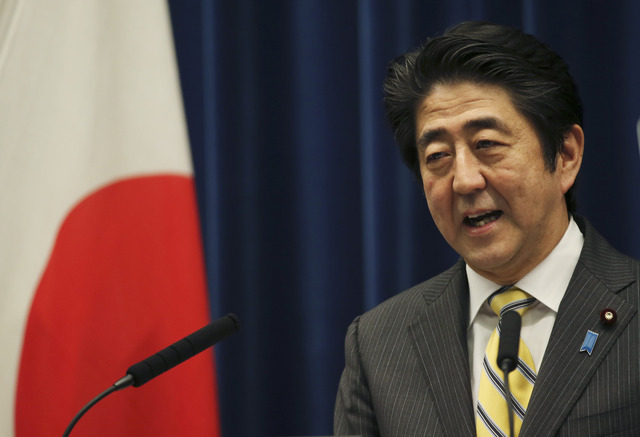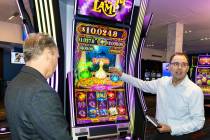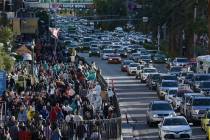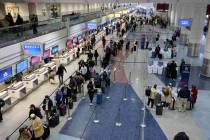High hopes for casinos in Japan

Don’t say “sayonara” to casinos in Japan quite yet.
Japanese lawmakers are just taking a summer break.
The country’s prime minister even said he’ll push for casino legalization when the Diet, Japan’s national legislature, returns for a special session in September.
Which means Las Vegas’ top gaming executives will spend more time across the Pacific Ocean later this year.
Although nothing was resolved over the past few months in what seems to be a never-ending effort to bring casinos to Japan, gaming leaders and analysts walked away encouraged. Instead of dismissing the idea of casinos outright as in years past, Japanese lawmakers introduced a gaming bill and held a debate.
Many saw that as a moral victory.
“At this stage, we expect further progress when the session reconvenes in the fall, followed by an implementation bill passing within one year,” Macquarie Securities gaming analyst Chad Beynon told investors last month.
Meanwhile, Japanese Prime Minister Shinzo Abe was crystal clear: He wants the ruling party to make casinos a reality. Abe made his opinion known to Bloomberg News after the Diet session concluded June 22.
Japan is looking for ways to fund construction of about $2 billion in venues and infrastructure needed to host the 2020 Summer Olympics in Tokyo.
Gaming taxes — analysts predict casino revenue could range from $10 billion to $15 billion annually — are key for paying for projects associated with the Olympics.
The prime minister, who is 18 months into his first term in office, has become gaming’s best friend.
“Integrated resorts are expected to provide a great contribution to tourism, regional economies and industry, I think, and can be one of the key elements of Japan’s growth strategy,” Abe, 59, told Bloomberg News reporters in Tokyo.
Abe traveled to Singapore in May to speak at a regional defense conference and took a side trip to Genting Berhad’s Resorts World Sentosa Island and to Las Vegas Sands Corp.’s Marina Bay Sands. Wearing a suit and trailing reporters, Abe surprised tourists at the Sands’ rooftop infinity pool deck that overlooks the island nation.
Abe said he wants Japanese lawmakers to “deliberate with a perspective” on how casinos can boost Japanese tourism.
Once the session ended, however, Abe said casino development is key for boosting Japan’s economy, which ranks third in the world.
Most analysts believe Japan will agree to four hotel-casino complexes; one each in Tokyo and Osaka and two in regional destinations. The resorts are expected to follow the Singapore model and include multiple nongaming entertainment amenities such as shops, dining, theaters, convention space and possibly theme parks.
Las Vegas Sands, MGM Resorts International, Wynn Resorts Ltd. Malaysia-based Genting Berhad, Caesars Entertainment Corp, Macau-based Melco Crown and even Stanley Ho’s Hong Kong-based SJM have expressed more than a passing interest in Japan.
Las Vegas Sands Chairman Sheldon Adelson said his company would spend $10 billion to develop a resort in Japan. MGM Resorts Chairman Jim Murren believes Japan will eclipse Las Vegas and Singapore as the world’s second gaming market behind Macau. Recently, Caesars Chairman Gary Loveman said his cash-strapped company can finance a $5 billion Japanese resort.
Beynon said Japan is a “massive opportunity” for the U.S.-based casino industry. Japanese have embraced legal wagering, including horse racing, bicycle and boat races, a national lottery and pachinko parlors.
It might take until 2016 at the earliest before Japan would begin the formal proposal process. Even with a drawn-out timeline, Beynon said, a casino could open before the Olympics.
And casino operators remain interested.
Beynon said a single casino in Tokyo could be worth at least $8 billion in annual gaming revenue — more than the Strip’s yearly total — because of the city’s population of 13.4 million people and 10 million annual visitors.
He gave Las Vegas Sands the edge for a Tokyo project “given the company’s extensive experience and relationships in the region, track record, strong financial position and commitment to creating top-of-the-line integrated resorts.”
Japan’s lawmakers may not require foreign companies to involve a local investor, which would seem to benefit Las Vegas Sands. The company has not used local partners in Macau and hopes for a similar model in Japan.
But don’t count out the other casino giants.
Caesars has been discussing a development partnership with several notable Japanese companies, including the Fuji Television Network.
Caesars, which doesn’t have a casino in Macau, could focus on Osaka to avoid direct competition with Las Vegas Sands in Tokyo.
MGM Resorts is reportedly laying groundwork in both cities.
Casino operators are not the only gaming companies eyeing Japan.
Nevada’s slot machine industry — namely Bally Technologies and International Game Technology — would see a potential windfall from four casino complexes, each with 2,000 to 3,000 slot machines.
“On the supplier side, casino legalization would be broadly positive for the space,” Beynon said.
Howard Stutz’s Inside Gaming column appears Wednesdays and Sundays. He can be reached at hstutz@reviewjournal.com or 702-477-3871. Follow @howardstutz on Twitter.


















